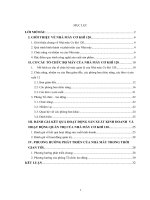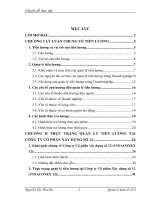12 tunjic minsys gold exploration
Bạn đang xem bản rút gọn của tài liệu. Xem và tải ngay bản đầy đủ của tài liệu tại đây (2.6 MB, 22 trang )
Mineral Systems
&
Gold Exploration
Outline of talk
Exploration Success- 3 examples
Phoenix Gold probability analysis test case
Relevance to exploration targeting at different
scales
Current state of play for exploration industry?
Janet Tunjic
Exploration Success using Mineral Systems Concepts
Deposit scale target identified in a mature well explored camp by incorporating mineral system
concepts
Critical Concepts
•
Structural architecture (particularly influence of early growth faults) (J Miller &
R Blewett)
•
Role of an intrusion to the south of the deposit as a possible
source/heat/fluids? (S Halley)
•
•
Chemistry of different basalts and preference for hosting gold deposits
Fluid migration and redox depositional environments (J Walshe & S Halley)
HAMLET
DEPOSIT
from Neumayr et al., 2008
>1Moz deposit discovered
Success in Applying Mineral Systems Concepts -Prediction through to Discovery
Camp scale target identified in a poorly explored region of the West African craton with extremely sparse data (identified for possible
acquisition)
Critical Concepts
•
What are the “fundamental building blocks” of the craton (J Hronsky & G
Begg)?
•
•
•
•
•
Where are the mantle tapping structures?
How does this all fit together (Jon Claoue-Long)?
Needed to construct a layer of greenstone belts?
Investigated alteration patterns through ASTER?
Integrated into a prospectivity analysis
Identified Mineralised Position Before Discovery
Success in Applying Mineral Systems Concepts From -Prediction Through to Discovery
Fekola Deposit
Fekola Deposit Regional Geology, Gold Deposits
Rand Gold Boron soil anomalies
Source latest Papillion Resources website
Source Rand Gold annual report
>3Moz deposit discovered (and growing)
Success in Applying Mineral Systems Concepts -Prediction Through to Discovery
Camp scale target identified in the Yilgarn
(potential acquisitions)
Critical Concepts
•
•
•
•
•
•
Architecture and where were the mantle tapping structures?
Folds and granite cored domes
Defined anomalism in magnetic and gravity data?
Fluids/alteration through ASTER?
Influence of intrusions?
Integrated into a prospectivity analysis
Mineralised System
Predicted and Subsequently Discovered
Mineral System Models
Source Jon Hronsky
assets/documents/34704-560500.gsa-talksep2010-compatibilitymode.pdf
/>
Fluid centric gold mineralisation models of
Jon Hronsky & Steven Cox
Geodynamics: Application to Exploration
From an explorers perspective
•
Thinking about an area as a collection
of individual components and how they
interact
•
•
Youngest domains host most of the gold
Understanding of
stratigraphy/structure, granites also
important
Literature Compilation of Age Dating for Ghana - 2009
D2
D3
NW-SE Comp.
NNW-SSE Comp.
Eburnean Orog.
Sinistral Slip
(2090 – 2075 Ma)
Au (~2060Ma)
14
Au (~2100Ma)
12
10
Gold Mineralisation Orogenic
Tarkwa reef mineralisation
Hydrothermal Gold
Hydrothermal Gold
(2122- 2099Ma)
(2070- 2034Ma)
8
Paleoplacer Gold
Ashanti Belt Tarkwain Seds
Birimian Sed/volcanics
6
Kumasi granitoids
Sefwi Belt Rhyolite
4
Granite suite
Bui Belt Granitoid
2
Cape Coast Granites
(2120- 2050Ma)
2300
2250
2200
2150
2100
2050
2000
1950
0
1900
Cape Coast Granite
2090 – 2075 Ma NW-SE Compression
Kib
i
Be
lt
Be
lt
an
ti
As
h
Ku
m
as
iB
as
in
Se
fw
i
Be
lt
Eburnean Orogeny
Kumasi Intrusive Activity
Dating of samples 2090-2075Ma
New Discoveries in the Kumasi Basin
2070 – 2034 Ma NNW-SSE Compression
Sinistral Strike Slip
D3 Au Mineralization
Dating of samples 2070-2034Ma
Ashanti belt
- explored
- 116Moz discovered
Kibi-Winneba belt
-
Underexplored
0.5Moz discovered recently
Metamorphic Facies with Au Showings- Abitibi
Source Flood Consulting
Gold preferentially found at greenschist-sub-greenschist boundary and greenschist-low amphibolite
boundary
Detail from “Metamorphic Map of the Canadian Shield”
GSC Map 1475A
Phoenix Gold - Test Case
Mineral systems and prospectivity mapping for
Broads Dam Tenements
Process:
•
Define data sets that are best proxies for
mineral system components
•
•
Broads Dam
Tenements
Location Map
Evaluate correlations statistically
Integrate layers with best correlations
Metamorphism, source of reduced fluids, structural weakness…
Broads Dam
Tenements
•
•
•
•
•
•
Outline of interpreted extent of M3a thermal anomaly (pre main gold event)
Strong correlation to gold deposits
Edge of Kurrawang basin- source of reduced fluids
Increased permeability and fluid flow
Weakened crustal region
Abundance of N/S trending structures which are incredibly important for localising
gold are located preferentially within this domain
Source Ben Goscombe
Depositional Environment: Redox Gradients
Oxidised fluids
•
•
Mo & Bi geochemistry
Mag anomalies
Reduced Fluids
•
•
As and Sb
Edge of Kurrawang basin
Fluids/Alteration/Intrusions
Broads Dam
Tenements
•
•
•
•
•
•
Gradients are important
Strong correlation to gold deposits
Mapping potassic alteration
Lithology
Fluid movement
Intrusions
Final Probability Map for Broads Dam Area
Final map, 15 layers incorporated
…not just structure!
•
Data layers were proxies for mineral system
components
Probability Map
•
Predicted the spatial position of known deposits
•
Identify 3 targets , currently being drilled
Mineral Exploration Expenditure Australia 2013
Better indication is the amount of exploration geologists recently retrenched
Explorers have been remarkably unsuccessful at discovering new deposits in Australia
Why would investors want to give their money to explorers?
/>
Are we Doing Anything Different to
Paddy’s Exploration Methods?
Tried and tested methods of testing gold soil
anomalies, stream sediment sampling and
stumbling across outcrop deposits are great
exploration tools but not the only tools
available.
There is a overwhelming need to change and be smarter, more cost efficient, more reliable…mineral
systems!
Drowning in Data?
Modern day explorers are required to effectively analyse
multiple datasets and identify map patterns critical for
predicting mineralisation:
•
e.g. gravity, magnetics, IP, AEM, worms, geology,
structure, folding, domes, spectra, metamorphic maps,
redox gradients, DEM, alteration haloes, regolith maps,
porphyry composition, mineralogy, ASTER, HYMAP,
geomorphology, basaltic compositions, tomographic
data, seismic, MT, alteration geochemistry, whole rock
geochemistry, till geochemistry.
•
And derivatives of these datasets
Applying Conceptual Mineral System Thinking to Exploration Finds
Deposits
Knowledge and Systems Thinking
•
Provides the explorer with a means of understanding the
enormous data as proxies for processes that formed
deposits
Creativity
•
Explorer have a framework to work within but still be
creative
Open Mind
•
Opens the search space to new possibilities beyond existing
dogma
Take Home Messages
•
•
•
•
•
Applying mineral systems concepts to exploration finds deposits
Challenging existing biases by engaging with academics and consultants is a good thing
Use data/concepts creatively
We don’t have a very good discovery success rate, support research and be more innovative!
Important for researchers to disseminate new findings to the wider community
Thank you
Janet Tunjic
Principal Geologist Optiro






